Many people coming to Korea to teach are starting on an E2 visa, which limits the work they are able to do to language teaching (conversational language teaching - not being allowed to Improteach maths, science or art is a whole other story!) and also leaves them at the mercy of their employers, since this visa is sponsored by the workplace. This means if you lose your job - you lose your visa and need to leave the country within 14 days or change to a D10 (Job Seeker) visa.
Given these constraints, it’s no surprise that many aspiring long-term residents seek a visa that offers greater freedom. For those who aren’t eligible for a marriage visa through marriage to a Korean national, the points-based F2-7 visa stands out as a beacon of hope. It represents independence and the opportunity to be self-employed, making it a popular choice for those planning to build a more stable and autonomous life in Korea.
F2-7 Visa Requirements
So, how does the F2-7 visa work, and what do you need to do? This visa uses a points-based system to figure out if you’re eligible or not. The basic requirements before the points can even be considered is 3 consecutive years on the same visa type.
What does that mean? If you’ve been on an E2 visa (for teaching) or an E7 visa (for a specialized profession) for three years straight, you’re good to go. But if you’ve switched visas—say you spent two years on an E2, then went on a D10 (job seeker visa), and then back to an E2—you’re out of luck. Even if your total time in Korea adds up to more than three years, it doesn’t count unless it’s all on the same visa.
There are some exceptions to this rule:
- if you’re earning 40 million KRW or more per year
- you have a recommendation from relevant ministries
- you got a Master’s degree while staying in Korea legally for more than 3 years on a D2 or D10-1 visa
So you’ve completed your three years as an E2 worker (or one of these exceptions apply to you) - What’s next? It’s time to look at the points system.
You’ll need at least 80 points to qualify, and these points come from a few different categories:
- Age: You get more points if you’re in certain age groups.
- Education: Higher degrees = higher points.
- Korean Language Skills: The better your Korean (measured by TOPIK or KIIP level), the more points you’ll earn.
- Income: The more you make, the more points you get.
- Volunteer Work: If you’ve been helping out in the community, you can add those points too.
- Bonus Points: Stuff like graduating from a top university, completing the KIIP program or getting a government ministry recommendation can give you an extra boost.
Once you’ve hit the magic number of 80, you’re ready to apply. This visa opens up so many possibilities—no more restrictions to certain jobs or being tied to a single employer. It’s all about freedom and independence.
Breaking Down the Points
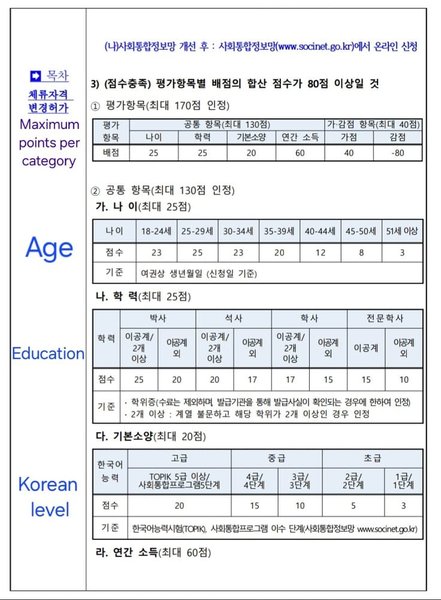
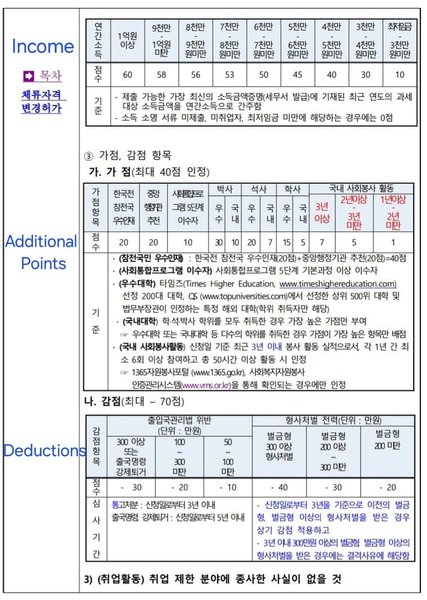
Points for Age
The first section for points is age, where you can get between 3-25 points. The older you get, the more points you lose, with the biggest drop of points when you turn 40 - a whopping 8 points disappear.
Required proof: Your passport
Points for Education
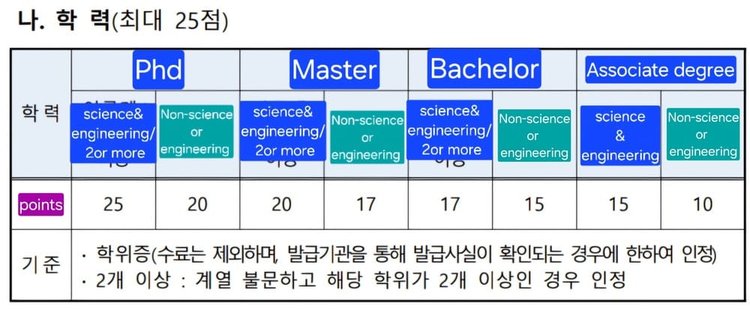
Science and engineering degrees have an advantage here, but people with 2 or more degrees can also receive more points.
The highest points (20 or 25 points) go to science and engineering PhDs, a master's degree is worth 17 or 20 points, a bachelor's degree bring you 15 or 17 points, and even with an associates degree, 10 or 15 points are available.
Attending a Top 500 university also gives extra points, which will be covered in the Additional Points section.
Required proof: Your degree certificate
Points for Korean Language Proficiency
Now let’s talk about Korean language skills. Both TOPIK and KIIP scores can be used here, and they’re worth the same points per level. You’ll get 3 points for level 1, all the way up to 20 points if you hit level 5 or higher.
Here’s something to keep in mind: KIIP certificates never expire, while TOPIK certificates are only valid for two years. So, if you’re deciding which route to take, that’s a big factor to consider.
Required proof: Your TOPIK certificate or your KIIP certificate, which you can download from socinet.go.kr.
Points for Income
Next up is income. This is the most important category, because it carries the highest number of points.
If you earn under 30 million KRW a year, you’ll only get 10 points. But once you hit 30-40 million KRW, your points jump to 30. Earning 40-50 million KRW a year gets you 40 points. From there, the points increase for every additional 10 million KRW, but the jumps get smaller and smaller.
Key thing to note: this is all about your taxed income—only the income listed on your year-end tax return counts. (If you’re not sure how to get your tax return, check out our Instagram post here for a step-by-step guide.)
A common pitfall here is untaxed allowances, like housing or meal stipends. For example, if you’re earning 2.5 million KRW a month, that should add up to 30 million KRW a year. But if 100,000 KRW per month is classified as a “lunch allowance,” your taxed income drops to 28.8 million KRW—leaving you just short of 30 million and missing out on 20 income points. Ouch.
The takeaway? Double-check what parts of your income are taxed and what aren’t. Knowing this ahead of time can save you from nasty surprises when the points are tallied up.
As for self-employed folks, the rules around taxed income are even trickier. That’s a whole other post for another day—especially if you want to keep your F2 visa after you get it.
Required proof: Your year-end tax return
Additional Points
Finally, we have the additional points and deductions section. While there are quite a few points up for grabs here, keep in mind that only a maximum of 40 points from this category can actually count toward your total, even if you technically qualify for more.
GKS (Global Korea Scholarship)
The first part of this section offers the highest points, but is also the toughest to qualify for. It’s specifically for people from countries that supported Korea during the Korean War. Even then, it only applies to certain students studying in Korea through the GKS (Global Korea Scholarship) program who have the right paperwork to back it up.
Required proof: A NIIED recommendation and GKS documentation.
Recommendation Letter From a Government Official
Another highly sought-after category in the additional points section is the 20 points you can get with a recommendation letter from a government official at the ministry level. However, this one is tricky—it’s all about who you know. So far, there aren’t many success stories, but hey, it’s not impossible if you’ve got the right connections.
Required proof: A letter of recommendation from a government official
Extra Points for KIIP 5
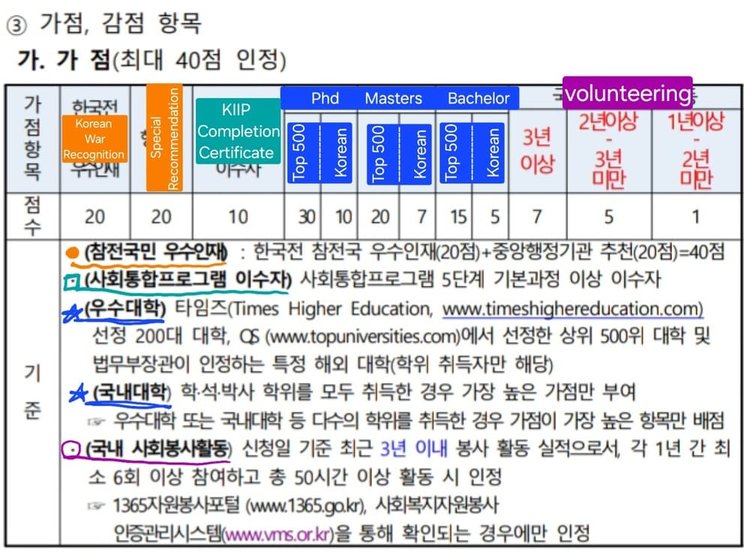
The third section, worth 10 points, is the reason many people say KIIP is better than TOPIK. While both TOPIK Level 5 and KIIP Level 5 give you the same 20 points in the language section, completing KIIP Level 5 comes with a bonus: 10 extra points here. And all you have to do is finish KIIP Level 5 and pass the exam—pretty sweet deal, right?
Required proof: Your KIIP Level 5 Completion Certificate, which you can download from socinet.go.kr.
University Degree
University degrees can also score you extra points. If you graduate from a Korean university, you’ll get 5-10 points, depending on the level of your degree. On the other hand, graduating from a Top 500 University earns you 15-30 points, which is a big boost.
However, the Top 500 list changes every year, and only the ranking at the time of your visa application matters. It doesn’t matter if your university was in the Top 500 when you graduated—what counts is where it stands now. To check, you can use these websites:
Another thing to keep in mind is that points don’t stack for multiple degrees. For example, if you have two master’s degrees, you can’t get the Top 500 bonus for one degree and the Korean bonus for the other. Only one bonus will be counted, so make sure to choose wisely.
Required proof: Your Korean degree certificate or a printout of the Top 500 ranking showing your university.
Volunteering
Volunteering in Korea can also earn you a few extra points, and every little bit helps! Here’s how it breaks down:
- 1-2 years of volunteering = 1 point
- 2-3 years = 5 points
- Over 3 years = 7 points
But not just any volunteering will count—it needs to be officially registered on one of these two websites:
To qualify, you also need to complete at least 50 hours of volunteering spread over 6 different occasions to count as 1 year of volunteering. So, unfortunately, those heroic three-day all-nighters won’t count!
Required proof: A volunteering certificate from one of the websites above.
Point Deductions
Lastly, let’s talk about deductions—yes, fines can cost you points on your application.
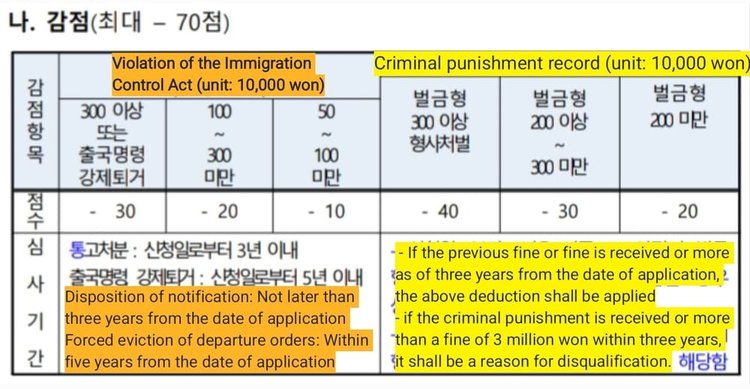
Criminal law fines, such as traffic violations, are a big deal:
- A fine of less than 2 million KRW will deduct 20 points from your score.
- A fine of more than 3 million KRW will hit you even harder with a 40-point deduction.
There’s also a separate section for immigration-related fines, like overstaying your visa:
- Fines between 500,000 and 1 million KRW will cost you 10 points.
- A fine of more than 3 million KRW will dock you 30 points.
The takeaway? Keeping a clean record—both legally and with immigration—is critical if you want to maximize your points for the F2-7 visa.
Improving Your Score
Now that you’ve got all the points laid out, you’re probably wondering: how can I boost my score in each category?
Unfortunately, there’s not much you can do about age—time waits for no one. Education is another tricky one since it’s both expensive and time-consuming to complete another degree. That said, if you’re thinking long-term and considering the F5 visa in the future, getting a Master’s degree from a Korean university might be worth the effort, since it reduces the GNI requirements later on.
Improving Language Skills
The easiest category to improve? Your Korean level. It’s by far the most accessible way to rack up extra points without spending a ton of money or years of your life.
What if you’ve never taken any Korean classes or tests? Let’s break it down.
If you’re starting from scratch, TOPIK might be the faster route to earn points, especially since there are several exams held each year. In the past, signing up was a nightmare—the website used to crash constantly, and seats filled up within minutes. But things are looking better now. They’ve rolled out a new website and increased the number of exams, so your chances of securing a spot are much higher.
TOPIK is less about traditional Korean study and more about exam practice, especially when it comes to the writing section. The way questions are worded can be tricky, so getting familiar with the format is key. The test is divided into two parts: TOPIK I (Levels 1-2) and TOPIK II (Levels 3-6), and both exams are usually held on the same day.
The official TOPIK website has everything you need, including signup dates, practice exams, and general information to help you gauge your level. There are also several other websites with information and practice exams:
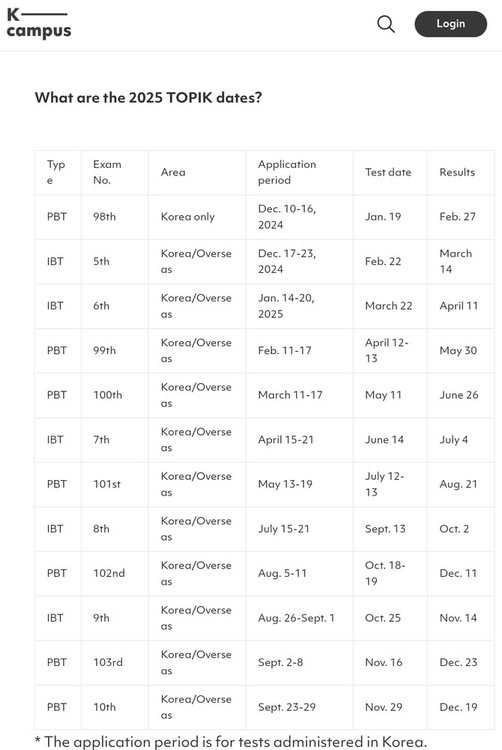
A few tips:
- You’ll need to create an account on the TOPIK website (including uploading a picture) before you can sign up for the exam. Make sure to do this well ahead of the registration date to avoid stress.
- Remember, TOPIK certificates are only valid for two years, so don’t wait too long to apply for your visa after passing.
Having a TOPIK certificate can actually make it easier to join the Korean Immigration and Integration Program (KIIP), known as 사회통합프로그램 in Korean. The evaluation test for KIIP used to be highly competitive, but with recent changes, more tests are available—both computer-based and paper-based—making it more accessible.
All the information you need about KIIP can be found on www.socinet.go.kr where you will need to make an account first. After that, the website has information on the course, required hours per grade, exam process and a lot more. For those with very little Korean understanding, opening the website in Google Chrome will automatically translate it for you. It’s a lifesaver!)
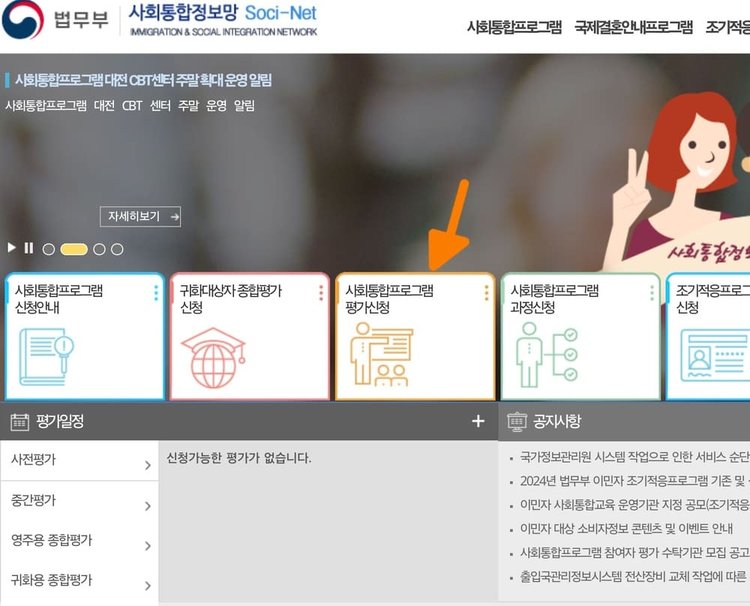
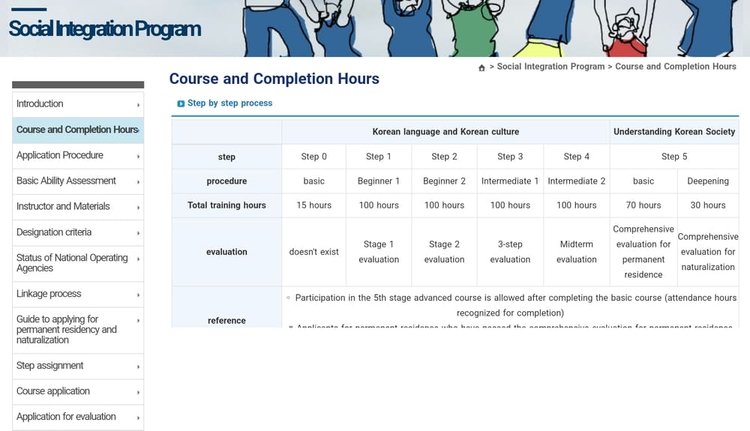
Information for exam dates and class registration dates will be posted here, but each immigration office seems to have their own posting time. New classes for the first semester are usually announced around the middle of January each year.
The below schedule shows the 2025 dates for exams, including registration dte, exam date and the date you'll get the results. It a.so shows the semester start and end dates, with the new semester opening from the 2nd of January 2025.
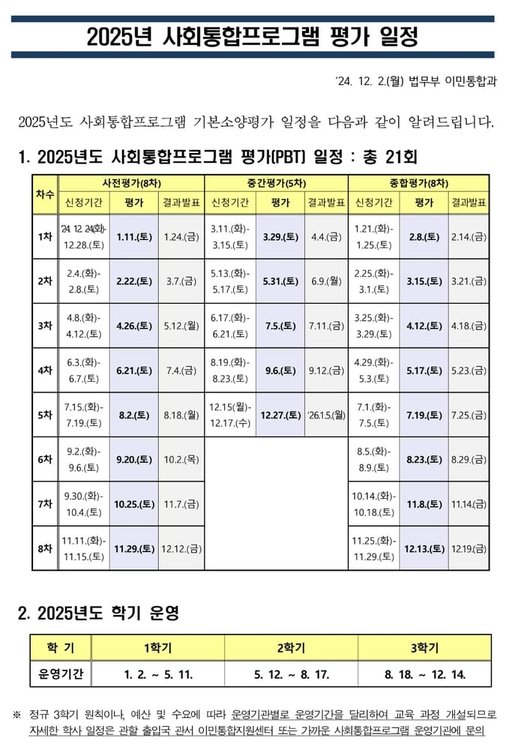
For the pre-evaluation exam there is now a separate website, so you will need to create a new login on www.kiiptest.org as well. The KIIPTest website is packed with useful details, including information about the testing process, rules, signup steps, and the all-important schedule for the pre-evaluation exam.
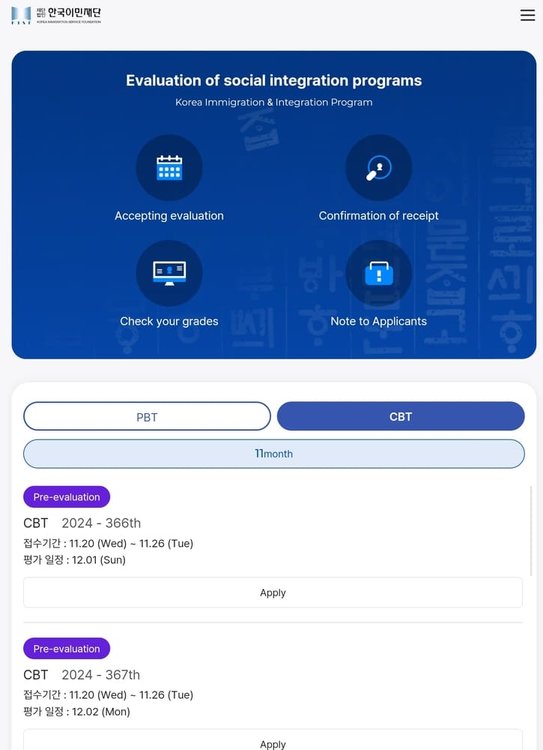
Already have a valid TOPIK certificate? Great! You can register it with KIIP to jump straight into the appropriate level—no need to take another test.
No TOPIK certificate? You’ll need to sign up for the pre-evaluation test instead. To skip Level 0, you’ll need to score at least 3 points in the speaking section. After that, your scores across all sections will determine your placement.
One thing to keep in mind: the pre-evaluation result is only valid for two years. If you haven’t signed up for a class during that time, you’ll have to retake the exam.
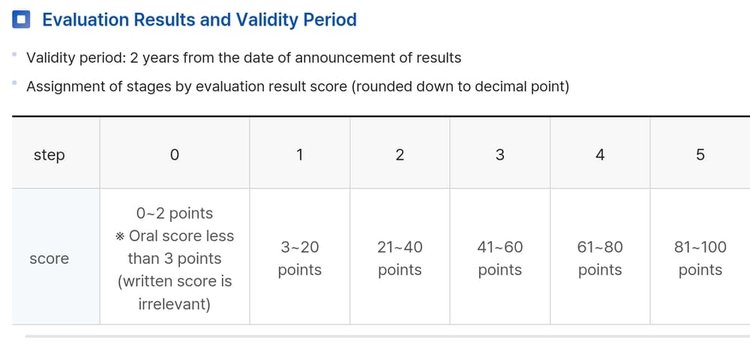
Once you’ve passed the pre-evaluation exam and received your level placement, you’ll be able to register for classes. These will show up on the Socinet website when the new application period opens. Be sure to carefully check the class location, as popular areas tend to fill up fast. Thankfully, there are usually several day and time options available, so most people can find something that works with their schedule.
Sadly, KIIP will no longer be free, so check carefully which fees are required for your level, as some exceptions apply too.
Improving Income Points
Increasing your income isn’t easy, but if you’re starting a new job, it’s worth negotiating to have your full salary taxed. For example, if your contract includes housing and lunch allowances, make sure it’s explicitly stated that these amounts will be taxed—or, better yet, have no separation between salary and allowances in your contract. Instead of writing “2.5 million KRW + 0.5 million KRW housing,” try to get your salary listed as a flat 3 million KRW. This way, your full income is counted for tax purposes and your year-end tax return reflects the highest possible income points.
Improving Additional Points
If you’re looking to maximize your score:
- Keep studying and push through KIIP Level 5 for those 10 bonus points.
- Look for volunteering opportunities—this can really add up. Fun fact: donating blood also counts toward your volunteering hours!
- Check out groups like Hippie Korea (on Facebook, Instagram, and YouTube) for other volunteering opportunities.
Stay Fine-Free
Avoiding fines is crucial, as they can really hurt your score. And remember, the details for each points category can change over time, requirements may be added, so make sure to research each area thoroughly to avoid any surprises.
Community Support
Applying for a new visa can be stressful, and there are many changes and updates to keep on top of.
Facebook communities such as F2-7 Visa holders in Korea are an invaluable resource for support, information and the latest updates. Be sure to search for answers to questions before posting your own, as the chances are high that someone else asked the same question before. Also check the group files, as the F2 visa manual and points list can be accessed there too.
Korean Immigration and Integration Program (KIIP) is another helpful community ready to support members through their KIIP journey. It has a lot of advice and information for the sign up process, tests and study materials, so be sure to join it for more advice.
Both these communities have specific goals, and as such it's important to stay on topic; general chats and comments could clutter the group and make it hard for people to find the answers to their questions. There are however many people who have gone through the F2-7 process, so communities such as Expats in Korea are the perfect place to share your concerns, read about experiences from other members and ask for advice not covered specifically by other groups.
Hopefully, these steps will help guide you toward securing the F2-7 visa. Best of luck on your journey to F(2)reedom!






